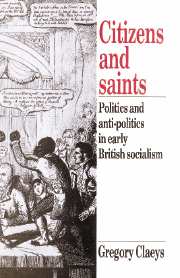Book contents
- Frontmatter
- Contents
- Acknowledgements
- List of Abbreviations
- Introduction:
- PART I THE ROOTS OF POLITICAL AND ANTIPOLITICAL SOCIALISM
- PART II SOCIAL SCIENCE, POLITY AND ECONOMY
- PART III THE ORIGINS OF SOCIAL RADICALISM
- 5 Owenism and the emergence of social radicalism, 1820–35
- 6 Owenism and Chartism, 1836–45
- 7 The legitimation of political socialism
- 8 Social radicalism, the state and revolution
- Bibliography
- Index
8 - Social radicalism, the state and revolution
Published online by Cambridge University Press: 04 December 2009
- Frontmatter
- Contents
- Acknowledgements
- List of Abbreviations
- Introduction:
- PART I THE ROOTS OF POLITICAL AND ANTIPOLITICAL SOCIALISM
- PART II SOCIAL SCIENCE, POLITY AND ECONOMY
- PART III THE ORIGINS OF SOCIAL RADICALISM
- 5 Owenism and the emergence of social radicalism, 1820–35
- 6 Owenism and Chartism, 1836–45
- 7 The legitimation of political socialism
- 8 Social radicalism, the state and revolution
- Bibliography
- Index
Summary
The convergence of the social and political reformers after 1845 marked an important if disappointing nexus in the history of British radicalism. Unpolitical socialism, far more ambitious than consumer co-operation but nonetheless uninterested in parliamentary reform, would never again inspire much support. Nor could working class radicalism any longer neglect the delineation of at least some ‘social’ ends. Thirty years of arduous effort had not attained the ballot for the unpropertied working classes or the ‘perfect state of society’ for Owenism. Many Chartists were forced therefore to conclude that until the economic power of the landed and commercial aristocracies had been curtailed considerably, significant social and political reform could never be achieved, or would remain of only superficial value. Many socialists also deduced that without state action the prospects for meaningful social reform were extremely limited. Others added to this the belief that in order to generate the mass appeal necessary for political reform, socialism itself would have to reflect the more traditional democratic aspirations of working class radicalism.
Though there was certainly more social radical activity in the 1850s and 1860s than has been hitherto recognised, a detailed examination of this period would probably contribute little to our understanding of the central themes treated here. A new language of politics had been established by the early 1850s which did not alter substantially in the near future, and indeed has retained many of its leading characteristics to the present day.
- Type
- Chapter
- Information
- Citizens and SaintsPolitics and Anti-Politics in Early British Socialism, pp. 285 - 326Publisher: Cambridge University PressPrint publication year: 1989

